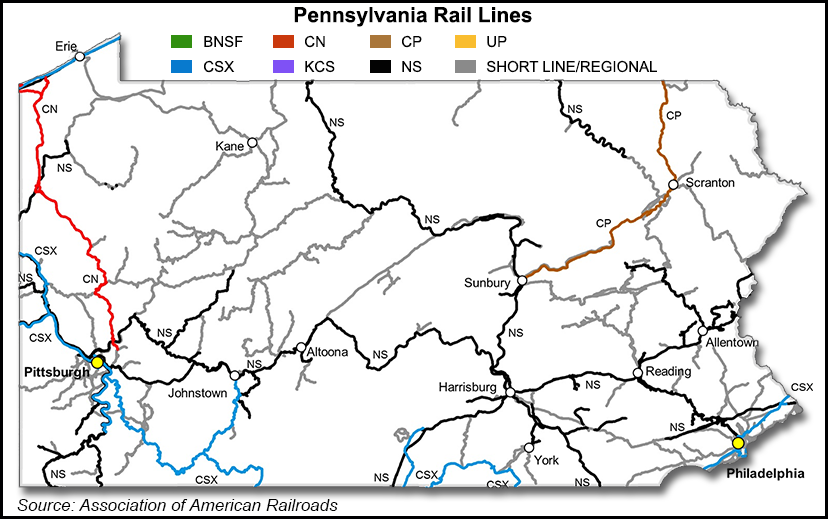Marcellus | E&P | NGI All News Access | Utica Shale
Gov. Wolf’s Adviser Urges Tighter Pennsylvania Crude-by-Rail Standards
An adviser to Pennsylvania Gov. Tom Wolf on Monday released an 84-page report assessing the risk that crude oil trains pose as they pass through the state, recommending 27 steps that could be taken to make the transport safer.

Director of the University of Delaware’s Railroad Engineering and Safety Program Allan Zarembski has been at work on the report since May, after he was hired by Wolf as part of the governor’s push for better crude-by-rail standards with the sharp spike in shipments that have corresponded with growing oil production in North Dakota’s Bakken Shale (see Shale Daily, April 28). Up to 70 trains carrying crude oil travel through the state each week on their way to refineries in Philadelphia or others on the East Coast. Two of the nation’s major publicly traded rail companies, CSX Corp. and Norfolk Southern Corp., have a strong presence in the state.
“Protecting Pennsylvanian’s is my top priority and Dr. Zarembski’s report is important in helping my administration take the necessary steps,” Wolf said after the report was released. “I will also continue to work with CSX and Norfolk Southern, both of which have demonstrated concern for rail safety and an interest in working with my administration.”
Although the U.S. Department of Transportation (DOT) primarily oversees rail safety and inspection under federal law, Zarembski’s report focused on derailment risk, tank rupture risks and regulatory oversight. Among his recommendations are stronger coordination between federal and state agencies, such as the Pennsylvania Public Utility Commission, which he said should consider adding a third railway inspector and filling the vacancy of another. He also urged Pennsylvania to offer its support in setting “national minimum” standards for all crude-by-rail transport.
Last year, more than 100 accidents occurred involving oil trains, with derailments continuing this year in West Virginia, Illinois and Canada (see Shale Daily, Feb. 17). In response, DOT has issued a final rule on shipping flammable liquids by rail, including crude oil and other petroleum products (see Shale Daily, May 1). The new proposed DOT and industry standards include up-to-date tank car design, speed reduction and better brakes, among other things.
But the Wolf administration said that despite the DOT’s proposals and industry advances, it remains concerned about the safety of crude-by-rail, particularly the potential for urban accidents.
In the report, Zarembski recommends an array of tests be conducted on the state’s railroads at least eight times per year. He also urges CSX and Norfolk Southern to complete their analysis of hazardous flammable train routes as quickly as possible. The report encouraged both companies to adopt Burlington Northern and Santa Fe’s voluntary speed reduction to 35 miles per hour for crude oil trains and employ more monitoring equipment on trains to prevent accidents.
There have been no major oil train disasters in Pennsylvania. In January 2014, however, a 101-car CSX train partially derailed on a bridge over the Schuykill River near Philadelphia. Six of its cars were carrying crude oil, but no injuries were reported.
CSX Corp. and Norfolk did respond to the report. But in separate statements issued earlier this year, both companies said they would be willing to work more closely with the Wolf administration after the governor sent a letter urging them to comply with new federal rules for transporting flammable liquids (see Shale Daily, May 20).
© 2024 Natural Gas Intelligence. All rights reserved.
ISSN © 2577-9877 | ISSN © 2158-8023 |
